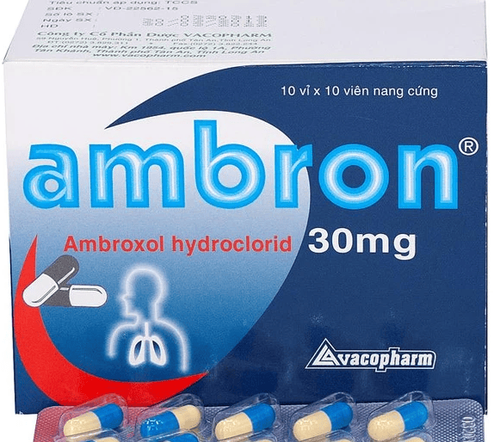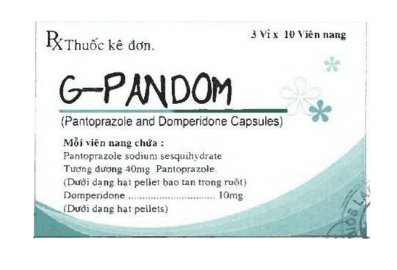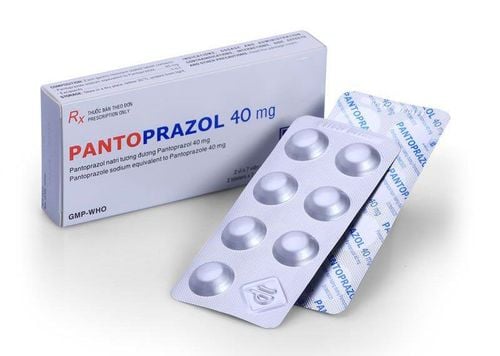This is an automatically translated article.
Atipantozol belongs to the group of gastrointestinal drugs and is indicated for the treatment of gastric and esophageal ulcers. Let's find out what Atipantozol does in the article below.
1. What is Atipantozol?
Atipantozol medicine contains Pantoprazol 40mg and other excipients, just enough for 1 tablet. The drug is prepared in the form of enteric coated film-coated tablets, box of 2 blisters, 3 blisters, 5 blisters, 10 blisters, each blister has 10 tablets.
2. What are the effects of Atipantozol?
Atipantozol is indicated for the treatment of the following cases:
Gastroesophageal reflux disease (GERD). Treatment of gastrointestinal ulcers. Pathological hypersecretion in Zollinger-Ellison syndrome. Prevention of ulcers caused by non-steroidal anti-inflammatory drugs. In addition, Atipantozol is contraindicated in the following cases:
The patient is allergic to the active ingredient Pantoprazol and other excipients in the composition of the drug. Patients who are allergic to Benzimidazole derivatives such as Esomeprazole, Lansoprazol, Omeprazol, Rabeprazole.
3. Dosage and how to use Atipantozol
How to use:
Atipantozol is prepared in the form of film-coated tablets, so patients use it orally. The drug should be taken in the morning with cooled boiled water. The medicine can be taken before or after a meal. The patient should swallow the tablet whole without chewing it before taking it. Dosage of Atipantozol is as follows:
Gastroesophageal reflux syndrome (GERD:
Usual dose is from 20-40mg x 1 time / day, used continuously for 4 weeks, can be extended to 8 weeks. maintenance use from 20-40mg per day In case of relapse, use 20mg/day Gastrointestinal ulcers:
Use 40mg x 1 time/day Continuous treatment for 2 to 4 weeks for patients with duodenal ulcer and from 4 to 8 weeks for patients with benign gastric ulcer Eradication of Helicobacter pylori causing peptic ulcers:
Use a 1-week triple combination therapy regimen with a dose of 40mg x 2 times/day in combination with clarithromycin 500mg x 2 times/day and amoxicillin 1000mg x 2 times/day or metronidazol 400mg x 2 times/day Stomach ulcers caused by non-steroidal anti-inflammatory drugs:
Use with dose 20mg daily Zollinger - Ellison syndrome:
Use at a dose of 80mg x 1 time/day, adjust dose as needed.Most patients are effectively controlled at doses between 20 - 20 mg/day. 120mg/day, but up to 240mg/day can be used. With a daily dose of more than 80mg, the drug should be divided into 2 oral doses. Patients with liver failure:
Use a maximum dose of 20mg/day or 40mg/day for alternate days. Patients with renal failure:
Use with a maximum dose of 40mg/day. Note: The above dosage is only the recommended dosage. The treating doctor depends on the condition of each patient to prescribe the appropriate dose.
4. Atipantozol side effects
The doctor always considers the benefit that Atipantozol brings to the patient and the possible risk of side effects to prescribe the appropriate drug.
Atipantozol is generally well tolerated, even with short-term and long-term treatment, side effects are usually mild and transient, usually disappearing when treatment is stopped. Proton pump inhibitors reduce the acidity of the stomach, which may increase the risk of gastrointestinal infections.
Common:
Fatigue, headache, skin rash, urticaria, myalgia, arthralgia. Uncommon:
Asthenia, dizziness, dizziness, pruritus, elevated liver enzymes. Rare:
Sweating, peripheral edema, irritability, anaphylaxis, alopecia, angioedema, stomatitis, belching, gastrointestinal disturbances, blurred vision, photophobia, insomnia, somnolence, hallucinations, impotence, hematuria, interstitial nephritis, jaundice, encephalopathy in liver failure, hyponatremia. In case the patient has rare side effects that are not mentioned in the instruction sheet. Inform your doctor or medical person immediately if you suspect any side effects of Atipantozol.
5. Atipantozol drug interactions
Some drugs that may interact when used in combination with Atipantozol include:
When using Atazanavir or Nelfinavir antiviral drugs with Atipantozol, it will reduce the concentration of Atazanavir or Nelfinavir in plasma, leading to to reduce the effectiveness of the drug during treatment. Anticoagulants used concurrently with Atipantozol increase INR and prothrombin time, leading to bleeding and possibly death. Atipantozol reduces the absorption of antirejection drugs. Drugs that are absorbed depends on gastric pH such as Ketoconazole, Ampicillin esters, Atazanavir, iron salts when used in combination with Atipantozol drugs may be reduced absorption. Concomitant administration of Atipantozol and Methotrexate (mainly at high doses) may increase and prolong the concentration of methotrexate and/or its metabolite, increasing the effect or risk of increasing the toxicity of the drug. To avoid interactions, before being prescribed Atipantozol, patients should inform their doctors about all the drugs they are using, including functional foods. The doctor will base on that to prescribe the appropriate Atipantozol.
6. Notes when using Atipantozol
Some notes when patients take Atipantozol as follows:
Be careful and reduce the dose in patients with liver failure, kidney failure or the elderly. The risk of severe hypomagnesaemia may occur with treatment with Atipantozol for at least 3 months and in most cases for about 1 year. The patient required magnesium supplementation and stopped taking it. In the elderly, caution should be exercised when high doses and long-term use of Atipantozol are associated with a slight increase in the risk of hip, wrist and spine fractures. In case the patient has symptoms such as a lot of weight loss, prolonged vomiting, difficulty swallowing, vomiting blood or black stools, suspected or ongoing stomach ulcer, the possibility of malignancy should be excluded because of the treatment. may alleviate symptoms and delay diagnosis. Check the expiry date and label of the medicine before use. Do not use Atipantozol if you see color change, change in taste or foreign objects inside. The drug can cause side effects such as dizziness and visual disturbances. Patients should not drive or operate machinery until the extent of the effects of the drug is uncertain. Pregnant women: When using the drug Atipantozol can leave serious consequences for the fetus such as miscarriage, malformation,... Therefore, this drug should not be used, unless absolutely necessary for the benefit of the fetus. therapeutic benefits of the mother. Lactation: There have been no accurate reports on the effects of this drug on mothers and infants. However, to limit the potential risk to the nursing infant, the drug should not be used unless directed by a doctor. In case the patient has to take medicine for the course of treatment, breast-feeding can be stopped.
7. What to do in case of missed dose or overdose of Atipantozol?
When forgetting a dose, the patient should take it as soon as he remembers, the medicine can also be taken 1-2 hours before the usual time of taking the medicine. However, the patient should skip the missed dose if it is almost time for the next dose and do not double the dose if the patient forgets to take the dose. When overdosing on Atipantozol, patients often experience symptoms such as drowsiness, convulsions, shortness of breath, impaired consciousness, respiratory failure, tachycardia, ... The patient should stop taking the drug and inform the doctor. treating doctor. Immediately take the patient to the nearest hospital when the condition worsens. Patients need to bring a prescription or medicine box so that the doctor can grasp the information and handle it quickly and promptly. Above is information about uses, dosage and precautions when using Atipantozol. To ensure safety for health and maximize the effectiveness of treatment, patients need to take Atipantozol exactly as directed by the doctor. Note, Atipantozol is a prescription drug, and patients absolutely must not use it without a prescription from a specialist.













